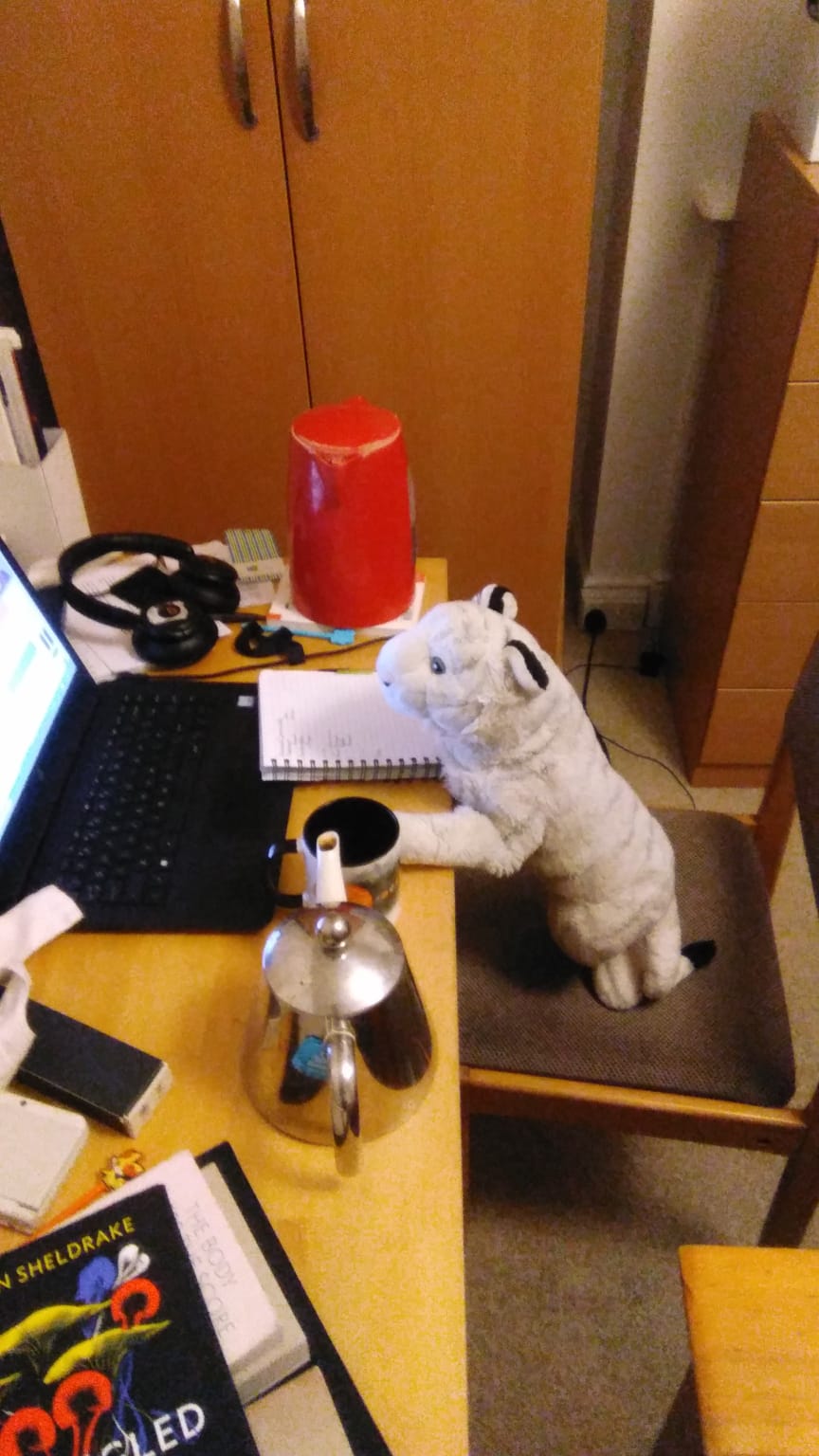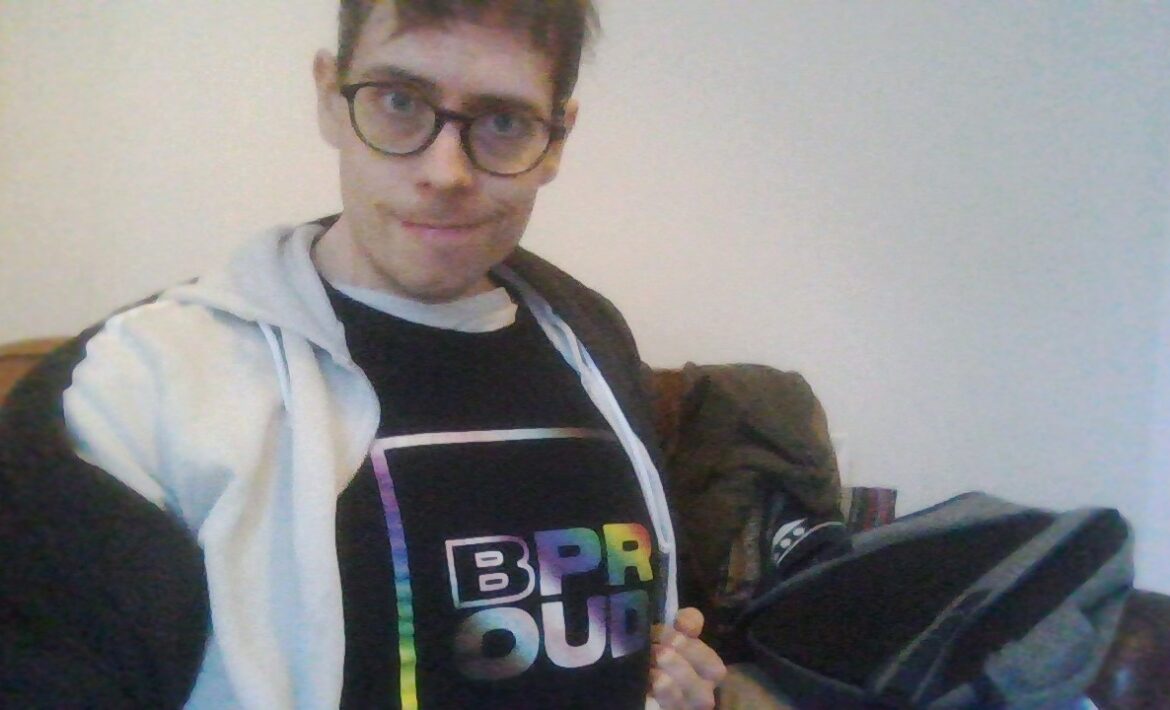
Monday 17th January 2022: On Public Speaking and Showbiz Anecdotes
Hi everyone!
I hope you’re all well. I’ve had a very busy week, doing lots of teaching, lots of admin, lots of meetings. My computer is still slow as molasses, so that’ll be on the list of “things for Jorik to buy.” Today, I’d like to talk about public speaking, specifically in the autism field.
Content warnings for discussions of mental health, meltdowns, medical trauma and drug abuse.
How to speak in front of people
Talking is what I do – way too much, in fact. In increasing amounts of different languages. As most of you will know by now, I did stand-up comedy for eight years, to basically no success. It taught me a lot of skills, that’s for certain. It was my special interest. It was my ticket “out”. Without stand-up comedy, I would never have met Harry Wright. Big stuff, then.
The first few years, before my breakdown in 2012, I was often so anxious that I could hardly perform. When I did well, I did really well, such as in Amsterdam in late 2011. But more often than not, I didn’t. I put way too much emphasis on “it” going “well”, which, due to my sheer insistence to myself, it didn’t. Overburdened with intention, some said. Needy, said others. Both were correct.
In 2013, I moved to London to do my MA at UCL and “do the circuit.” My plan was to gig once a night, at least, six nights a week. However, I was also still drugged up to the eyeballs. In early 2014, I started hosting a gig in Shoreditch called The Comedian’s Bookshelf, after the amazing Bisha K. Ali kindly handed me the reins. I… wasn’t good. Ever. The gig was essentially a series of public meltdowns from me. I wasn’t coping.
One of the lesser-attended gigs, I asked Deborah Frances-White to perform, after I’d been inspired by her on Marsha Shandur’s podcast back in 2011. I was terrible, the crowds were basically non-existent. She could see that. But she was incredible and kind to me. Even though my memory is patchy – not a surprise considering the amount of medication I was on – I remember her telling me to keep going. I’m still so grateful for that, as I was in a very dark place at that time.
After getting off the benzos and subsequently turning into a vaguely functioning human again, I have been using her 2014 TedTalk on charisma and stage fright to teach public speaking, especially to fellow ND people. Have a watch, it’s incredible:
This one video has taught me so much about the field I’m in now. I’m indebted to her, so, if her people are able to see it, please thank her for me, if that isn’t too creepy or self-involved.
Anyway.
Charisma and Stand-up Comedy
What Deborah says is that charisma can be learned and can be taught. Professional speakers are often dull as dishwater, so their audience only ever wants to look away, at their Blackberries. After watching this video, I decided to always be more interesting than email.
Frances-White says we can use our bodies to control our inner states – to a certain extent. Charismatic people, she says, are focused on the audience, not themselves and ‘the fear,’ however frightening the situation may be. As autistic comedians, Harry Wright and I needed to be extra aware of our bodies, since the way we come across to audience can be totally not how we intended. I’m tall, 6’4”, and if I’m not in a good state, my body is very clear in expressing that. The room can feel that something’s amiss.
There’s a video of me doing stand-up in 2014, for a competition. I am horrible in it. As much as my now partner felt rage at the people leaving dislikes on the video (and as much as that makes me love him more), they were right. I was not connecting to the audience. I wasn’t even connected to my own body. I look like a drug addict. I was, though not by choice. I’ve only ever taken medication by doctor’s orders. Still, it evidently fucked me up enough to make me look like I was dying. I was, in more ways than one.
When I got off the medication, things changed. In early 2017, I also started stand-up again (I quit for a while, after Brexit made me feel fundamentally unwelcome in my adopted home). I’d been exercising a lot, losing weight and I was more in charge of my body than I ever was before. I did a lot of teaching. I’ve always been tall, so I started using that for my own purposes, too. I now looked like a tall, 30 year-old professional gay who wears chinos and was slightly insane. Because I was.
The difference now, was that I was able to understand what my body was doing – again, most of the time. This allowed me to focus on the audience, rather than on not crumbling to dust on stage. I started gaining a good reputation around the Oxford comedy circuit. People would be interested in my work.
I then had a near-suicidal meltdown in September, after yet another job loss. That was on Thursday, gig day. Some of the acts saw me in that state and, after a while, I realised that I had become persona non grata again, in yet another social group. I quit stand-up altogether in 2018, after a terrible gig which followed a conversation where I’d received some ableist comments from someone who I thought was my friend.
I sucked. Again. But this time, I didn’t want to continue putting myself through the shit of doing stand-up and having to rely on other human beings to get me the work that I felt I deserved, after nearly a decade of paying my dues. Instead, I focused on writing and, accidentally, fell into autism activism. That made a huge difference, too. I could now be openly autistic and figure out a way of being on stage or in a classroom that was authentic (ish) but in a way that was beneficial to me rather than just telling the audience that I was not a threat.
Charisma and Public Speaking
Charisma, I think, is that. It’s the sense that a room of people gets from you – you’re not threatening, you’re likeable, but you’re also big (in my case, physically) and deserve to be listened to. Age helps here – I am now the age where I can get away with speaking the way I do and a room of people feeling confident in my presence. I’m also so much more in control of my body and my voice. I always had been – voices and characters in my stand-up were my thing. But now I didn’t have to be convinced that I was worth listening to. I never had confidence in my capacity to do anything, let alone stand-up. I wanted an audience to prove me wrong. In 2022, that’s not the case anymore. I was struck with that on Tuesday 4th February, where I spoke about autism (I did my Autism and the Neurodiversity Paradigm 1 training, see ‘Speaking’ on this very website!) at Kestrel House School, Crouch End, London.
It was so much fun.
From the moment I got into the room, any nerves were gone. I wanted to be there. I was totally focused on the people listening to me. It was exciting. I looked at them, figuring out the power relationships in the room, figuring out who was tired and who was overenergetic. I was using tricks I would have needed to have as a stand-up comedian, but could never use because I wasn’t well.
I was now able to be in a space and be totally unselfconscious and totally in control. I was really funny. I could talk about brutal stuff like early death, without the audience turning off. I made people cry and laugh and think and shift their paradigms – have a look at Lucy Allen’s testimony under ‘Testimonials,’ so you know it’s not just me.
I was properly autistic. I was not pretending not to be. Sometimes jokes didn’t land. Some parts of the group were not initially on board. But, as Deborah says in her Ted Talk, I knew I could recover. Finally, like she says, I can come on stay and exude “guys, I’ve got this.” The main focus was to educate these people on what being autistic is like, the power relations in society that underlie our often precarious existence and to make sure the young people in their care would have a better time than I had at their age.
Why? Because I knew that I could do something that had some use. I could do it in a way that was interesting, entertaining and captivating, all at the same time.
So do you want to be a speaker in disability activism?
I spoke to my friend (I hope I can call her that) Sarah Stephenson-Hunter on Friday night. We had a proper natter about the disability speaking field. I was feeling sad that I hadn’t had as many speaking gigs over the past six months. She has been doing amazingly, getting lots of exciting offers. We both moved house in late summer – but the difference is that she moved within her local area and I moved to a different part of the country.
One thing we came back to was actually something Deborah talks about in the video, which is that some speakers in the disability field cannot command the attention that their topic deserves. They’re like the stand-up comedians who’ve been going for a short time. The audience feels awkward and disengages. Is that fair? No, not at all. When speaking about disability rights, it shouldn’t be up to a disabled person to fluff up the suffering of their community in order to entertain able-bodied people. Point is, we don’t live in that world.
Neurotypicals need the spoonful of sugar to make the medicine go down. Otherwise they turn off and won’t do anything. That’s… a crappy attitude to have, really. Shouldn’t people want to do the right thing when they hear the truth? Er, yes, Mr. Strawman, but you’re being too autistic here. Facts and reality matter to us, not to them. They may say that they want hard truths, but without being able to mix in lightness, they will simply switch off, like someone trying to look at a solar eclipse through a CD-Rom and finding that they can’t manage the light.
So, am I saying every autistic speaker should do such and such? No. There is a difference between autistic speakers who are activists that can explain how autism works as an identity and autistic speakers with a science and research background. Both have massive value and add hugely to each other’s work (obviously, I’m the first kind, though I work closely with the research community, as a board member on a number of research projects).
Simply being right is not enough. That is a frustrating aspect of public speaking – there is a theatricality to it. Audiences are fickle and want to be entertained. When I was speaking at Kestrel House on January 4th, I knew that I needed to start with a joke, so I pointed to my suit and made a joke about weight gain during lockdown. That got most of them. I gave them permission to laugh and I gave myself the permission to be serious, with that one joke. As Blindboy said in a recent podcast, it’s the carnivalesque nature of being a bit ridiculous that allows us to confront an audience with unpleasant truths. For him, it’s a plastic bag he wears over his face. For me, it’s observational comedy and improvisation.
Like I said, that’s not fair – why can’t people take real people’s experience seriously? Isn’t the point that we need to be brave and vulnerable? Isn’t that why Brené Brown got so popular? (I’ll get to her one day, don’t worry).
Well, if you’re autistic and you speak your truth, the room will often simply turn off. Because the truth isn’t good enough for them. When working with neurotypicals, there needs to be a little bit extra – that charisma Deborah Frances-White talks about. Unfortunately, charisma is neurotypically coded. It takes a lot of talent, or a lot of years of hard work (again, I’m the second) to learn to strike a balance between the neurotypically-coded charisma that the audience wants and being authentically autistic. Now, I’m finally able to pull the audience in my direction.
I know that there is currently a backlash within the autistic training community – mostly from autistic trainers with many years behind them. They feel that younger autistic trainers aren’t educated enough and are snapping at their heels in a field that should rightfully be theirs. I disagree – probably because I don’t have a psychology degree or an autism master’s. But there are other issues to consider.
When it comes to autism, most educational materials that exist on our community are either too obvious to consider or actively malicious. A lot of what is still taught is based on conversion therapy (see previous blogs) and attempting to sell ABA, PBS, Teamteach or TEACHH. This includes degrees in medicine and psychology. Only in recent years have actually autistic people begun to be included in research that underlies these educational programmes, but without a paradigm shift in thinking so far. Right now, when it comes to autism, having no knowledge at all is better than having a PhD in abuse.
I was talking to my self-employment coach on Friday. The person I spoke to was a parent of an autistic child, proudly wearing a lanyard with Autism Speaks‘s puzzle pieces on it. They were using language that was indicative of a conversion therapy-inspired mindset. I actually told them they might benefit from some training, which may not have been super useful for my own chances, but I care more about the wellbeing of their child than someone I might never meet thinking I’m up my own arse.
Actually, if I cared about people thinking I was up my own arse, I wouldn’t write this on my personal blog, on a website named after me. I’m an egomaniac. I have no leg to stand on. Mostly because both of them are up my own arse.
Not every autistic should have to work fifteen years to be able to speak to people about their own lives, like I have. Some people may just have that je ne sais quoi that allows them to be super charismatic as well as authentic. I don’t have a solution to this, but insisting that every speaker is a trained medical professional is not going to be the way forward. We need to have more peer-support though and by the time I’ve established myself here a bit more, I’d love to engage with people who are interested in this too.
Conclusion
So? What have we learned? 1. I love public speaking, 2. I am up my own arse, legs-first. That’ll do it. I’ll see you next week!
xxx
Jorik


